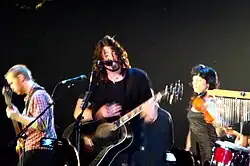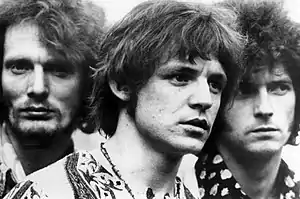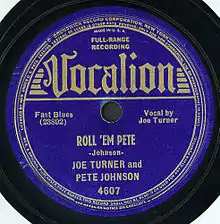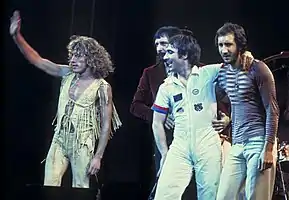The Rock Music Portal
Rock is a broad genre of popular music that originated as "rock and roll" in the United States in the late 1940s and early 1950s, developing into a range of different styles from the mid-1960s, particularly in the United States and the United Kingdom. It has its roots in 1940s and 1950s rock and roll, a style that drew directly from the blues and rhythm and blues genres of African-American music and from country music. Rock also drew strongly from genres such as electric blues and folk, and incorporated influences from jazz, classical, and other musical styles. For instrumentation, rock has centered on the electric guitar, usually as part of a rock group with electric bass guitar, drums, and one or more singers. Usually, rock is song-based music with a 4
4 time signature using a verse–chorus form, but the genre has become extremely diverse. Like pop music, lyrics often stress romantic love but also address a wide variety of other themes that are frequently social or political. Rock was the most popular genre of music in the U.S. and much of the Western world from the 1950s to the 2010s.
Rock musicians in the mid-1960s began to advance the album ahead of the single as the dominant form of recorded music expression and consumption, with the Beatles at the forefront of this development. Their contributions lent the genre a cultural legitimacy in the mainstream and initiated a rock-informed album era in the music industry for the next several decades. By the late 1960s "classic rock" period, a number of distinct rock music subgenres had emerged, including hybrids like blues rock, folk rock, country rock, southern rock, raga rock, and jazz rock, which contributed to the development of psychedelic rock, influenced by the countercultural psychedelic and hippie scene. New genres that emerged included progressive rock with extended artistic elements, glam rock, highlighting showmanship and visual style, and the diverse and enduring subgenre of heavy metal, with emphasis on volume, power, and speed. In the second half of the 1970s, punk rock reacted by producing stripped-down, energetic social and political critiques. Punk was an influence in the 1980s on new wave, post-punk and eventually alternative rock.
From the 1990s, alternative rock began to dominate rock music and break into the mainstream in the form of grunge, Britpop, and indie rock. Further fusion subgenres have since emerged, including pop-punk, electronic rock, rap rock, and rap metal. Some movements were conscious attempts to revisit rock's history, including the garage rock/post-punk revival in the 2000s. Since the 2010s, rock has lost its position as the pre-eminent popular music genre in world culture, but remains commercially successful. The increased influence of hip-hop and electronic dance music can be seen in rock music, notably in the techno-pop scene of the early 2010s and the pop-punk-hip-hop revival of the 2020s. (Full article...)
General images -
Selected article
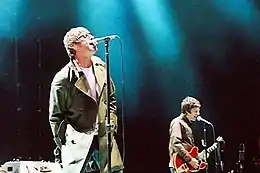
Oasis signed to independent record label Creation Records in 1993 and released their record-setting debut album Definitely Maybe (1994), which topped the UK Albums Chart and quickly became the fastest-selling debut album in British history at the time. The following year they recorded (What's the Story) Morning Glory? (1995) with new drummer Alan White, in the midst of a highly publicised chart rivalry with peers Blur. Spending ten weeks at number one on the British charts, (What's the Story) Morning Glory? was also an international chart success and became one of the best-selling albums of all time. In addition, it stands as the fifth-best-selling album in the UK and the biggest-selling album in the UK of the 1990s. The Gallagher brothers featured regularly in tabloid newspapers for their disputes and wild lifestyles. In 1996, Oasis performed two nights at Knebworth for an audience of 125,000 each time, the largest outdoor concerts in UK history at the time. In 1997, Oasis released their third album, Be Here Now. It became the fastest-selling album in UK chart history.
Oasis founding members McGuigan and Arthurs left in 1999 as Oasis released Standing on the Shoulder of Giants (2000). They were replaced by former Heavy Stereo guitarist Gem Archer and former Ride guitarist Andy Bell. White departed in 2004, replaced by Zak Starkey and later Chris Sharrock as touring members. Oasis released three more studio albums: Heathen Chemistry (2002), Don't Believe the Truth (2005) and Dig Out Your Soul (2008). The group abruptly disbanded after the departure of Noel Gallagher in August 2009.
As of 2009, Oasis have sold over 75 million records worldwide. They are among the most successful acts on the UK Singles Chart and Albums Chart, with eight UK number-one singles and eight UK number-one albums. The band also achieved three Platinum albums in the US. They won 17 NME Awards, nine Q Awards, four MTV Europe Music Awards and six Brit Awards, including one in 2007 for Outstanding Contribution to Music and one for the "Best Album of the Last 30 Years" for (What's the Story) Morning Glory?. They were also nominated for two Grammy Awards. (Full article...)
Selected biography

Jagger was born and grew up in Dartford. He studied at the London School of Economics before abandoning his studies to focus on his career with the Rolling Stones. In the late 1960s, Jagger starred in the films Performance (1970) and Ned Kelly (1970), to mixed receptions. Beginning in the 1980s, he released a number of solo works, including four albums and the single "Dancing in the Street", a 1985 duet with David Bowie that reached No. 1 in the UK and Australia and was a top-ten hit in other countries.
In the 2000s, Jagger co-founded a film production company, Jagged Films, and produced feature films through the company beginning with the 2001 historical drama Enigma. He was also a member of the supergroup SuperHeavy from 2009 to 2011. Although relationships with his bandmates, particularly Richards, deteriorated during the 1980s, Jagger has always found more success with the Rolling Stones than with his solo and side projects. He was married to Bianca Pérez-Mora Macias from 1971 to 1978, and has had several other relationships; he has eight children with five women.
In 1989, Jagger was inducted into the Rock and Roll Hall of Fame and, in 2004, into the UK Music Hall of Fame with the Rolling Stones. As a member of the Rolling Stones and as a solo artist, he reached No. 1 on the UK and US singles charts with 13 singles, the top 10 with 32 singles and the top 40 with 70 singles. In 2003, he was knighted for his services to popular music. The genus Jaggermeryx naida and the type species Aegrotocatellus jaggeri are named for him. Jagger is credited with being a trailblazer in pop music and with bringing a style and sex appeal to rock and roll that have been imitated and proven influential with subsequent generations of musicians. (Full article...)
Selected album
Sweetheart of the Rodeo is the sixth album by American rock band the Byrds and was released in August 1968 on Columbia Records. Recorded with the addition of country rock pioneer Gram Parsons, it became the first album widely recognized as country rock as well as a seminal progressive country album, and represented a stylistic move away from the psychedelic rock of the band's previous LP, The Notorious Byrd Brothers. The Byrds had occasionally experimented with country music on their four previous albums, but Sweetheart of the Rodeo represented their fullest immersion into the genre up to that point in time. The album was responsible for bringing Parsons, who had joined the Byrds in February 1968 prior to the start of recording, to the attention of a mainstream rock audience for the first time. Thus, the album is an important chapter in Parsons' crusade to make country music fashionable for a young audience.
The album was conceived as a history of 20th century American popular music, encompassing examples of country music, jazz and rhythm and blues, among other genres. However, steered by the passion of the little-known Parsons, this concept was abandoned early on and the album instead became purely a country record. The recording of the album was divided between sessions in Nashville and Los Angeles, with contributions from session musicians including Lloyd Green, John Hartford, JayDee Maness, and Clarence White. Tension developed between Parsons and the rest of the band, guitarist Roger McGuinn especially, and some of Parsons' vocals were re-recorded, partly due to legal issues. By the time the album was released Parsons had left the band. The Byrds' move away from rock and pop towards country music elicited a great deal of resistance and hostility from the ultra-conservative Nashville country music establishment, who viewed the Byrds as a group of hippies attempting to subvert country music.
Upon its release, the album reached number 77 on the Billboard Top LPs chart, but failed to reach the charts in the United Kingdom. Two attendant singles were released during 1968, "You Ain't Goin' Nowhere", which achieved modest success, and "I Am a Pilgrim", which failed to chart. The album received mostly positive reviews in the music press, but the band's shift away from psychedelic music alienated much of its pop audience. Despite being the least commercially successful Byrds' album to date upon release, Sweetheart of the Rodeo is today considered to be a seminal and highly influential country rock album. (Full article...)
Selected song
"City of Blinding Lights" is a song by Irish rock band U2. It is the fifth track on their eleventh studio album, How to Dismantle an Atomic Bomb (2004), and was released as the album's fourth single on 6 June 2005. It was produced by Flood, with additional production by Chris Thomas and Jacknife Lee. The song reached number one in Spain, and peaked in the top ten in Canada, Ireland, the United Kingdom, and several other countries. The music video was shot at the General Motors Place in Vancouver, British Columbia, Canada.
The earliest incarnation of the song was developed during sessions for the band's 1997 album, Pop. The lyrics were written by the band's lead vocalist Bono, taking partial inspiration from his recollection of his first trip to London, and from the band's experience playing in New York City in the aftermath of the September 11 attacks during their Elevation Tour in 2001. Other lyrics refer to Bono's relationship with his wife Ali. The song's underlying theme reflects lost innocence and was inspired by an image Bono saw of himself from the early 1980s. The sound has been compared to the tone of U2's 1984 album, The Unforgettable Fire and their 1987 single "Where the Streets Have No Name".
"City of Blinding Lights" was well received by critics and won a Grammy Award for Best Rock Song at the 2006 ceremony. The song made its live debut on the group's 2005–2006 Vertigo Tour, when it was commonly played as the opening song. It has been performed at nearly every show from a U2 concert tour since. The track has been used in episodes of The Simpsons and Entourage, and in the film The Devil Wears Prada. Former U.S. President Barack Obama used the song at his campaign events during the 2008 and 2012 U.S. presidential elections, and listed it as one of his favourite songs; U2 performed it at his 2009 inaugural celebration at the Lincoln Memorial. (Full article...)
Selected picture

Leonard Cohen performing at King's Garden, Odense, Denmark, on 17 August 2013.
Did you know (auto-generated)
- ... that heavy metal led Ossian D'Ambrosio to druidism?
- ... that the neofolk album The Lone Furrow features several guest vocalists from heavy metal bands, and critics thought it might appeal to fans of that genre?
- ... that Greg Cooper based the character of suffragist Kate Sheppard in punk-rock musical That Bloody Woman on Bette Midler in concert in Cleveland?
- ... that raw material waste from the West influenced a generation of rock music in China?
- ... that Skálmöld & Sinfóníuhljómsveit Íslands documents a symphony orchestra playing heavy metal music?
- ... that when rock musician Warren Zevon received a terminal diagnosis of lung cancer, he learned to "enjoy every sandwich"?
Selected genre
The new wave of British heavy metal (commonly abbreviated as NWOBHM) was a nationwide musical movement that started in England in the mid-1970s and achieved international attention by the early 1980s. Editor Alan Lewis coined the term for an article by Geoff Barton in a May 1979 issue of the British music newspaper Sounds to describe the emergence of new heavy metal bands in the mid to late 1970s, during the period of punk rock's decline and the dominance of new wave music. (Full article...)
Selected audio
Related portals
WikiProjects
- WikiProject Rock music (Main rock project)
- WikiProject Metal
- WikiProject Black Metal
- WikiProject Alternative music
- WikiProject Punk music
- WikiProject Progressive Rock
- WikiProject Music Directory
Things you can do
Expand: College rock, Electronic rock, Pop rock
Clean Up: Instrumental rock, Rap rock, New wave, Industrial rock, Progressive metal, Southern rock, Folk rock, Funk rock, Space rock
Add Sources: Pagan rock
Join one of the many WikiProjects pertaining to Rock music.
News
No recent news
More articles -
Year Zero is the fifth studio album by American industrial rock band Nine Inch Nails, released by Interscope Records on April 17, 2007. Conceived while touring in support of the band's previous album, With Teeth (2005), the album was recorded in late 2006. It was produced by Trent Reznor and Atticus Ross, and was the band's first studio album since 1994's The Downward Spiral that was not co-produced by long-time collaborator Alan Moulder. It was the band's last album for Interscope, following Reznor's departure the same year due to a dispute regarding overseas pricing.
In contrast to the introspective style of songwriting featured on the band's previous work, the record is a concept album that criticizes contemporary policies of the United States government by presenting a dystopian vision of the year 2022. It was part of a larger Year Zero project, which included a remix album, an alternate reality game of the same name, as well as a conceived television or film adaptation. The game expanded upon the album's storyline, using websites, pre-recorded phone messages, murals, among other media in promotion of the project. The album was promoted by two singles: "Survivalism" and "Capital G". (Full article...)More did you know...
- ... that David Bowie's first gig as lead singer was at the Green Man, Blackheath?
- ... that Carlton le Willows Academy alumni include cricketer Mark Footitt, Air Supply singer/guitarist Graham Russell, and balloonist Janet Folkes?
- ... that the video for Marilyn Manson's soft-rock ballad "Running to the Edge of the World" was widely condemned for its depiction of violence against women?
- ... that Susan Beschta was a punk rocker and federal judge?
.jpg.webp)
- ... that the FM Non-Duplication Rule adopted by the FCC 59 years ago led to the creation of the album-oriented and classic rock radio formats?
- ... that The Elvis Dead, a retelling of Evil Dead II in the style of Elvis Presley, features songs such as "Standing in a State of Shock", "I've Been Possessed", and "Wrapped Up in Vines"?
Major topics
Subcategories
Associated Wikimedia
The following Wikimedia Foundation sister projects provide more on this subject:
-
 Commons
Commons
Free media repository -
 Wikibooks
Wikibooks
Free textbooks and manuals -
 Wikidata
Wikidata
Free knowledge base -
 Wikinews
Wikinews
Free-content news -
 Wikiquote
Wikiquote
Collection of quotations -
 Wikisource
Wikisource
Free-content library -
 Wikiversity
Wikiversity
Free learning tools -
 Wikivoyage
Wikivoyage
Free travel guide -
 Wiktionary
Wiktionary
Dictionary and thesaurus
-
 List of all portals
List of all portals -

-

-

-

-

-

-

-

-

-
 Random portal
Random portal -
 WikiProject Portals
WikiProject Portals





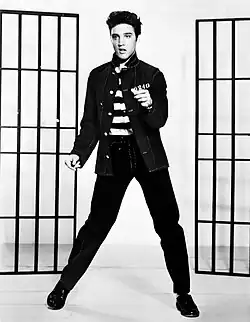



.JPG.webp)

